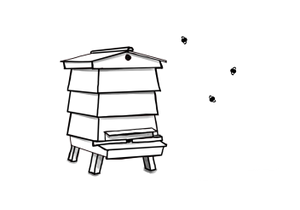"Eat honey, my son, for it is good." — Proverbs, 24:13
In a climate reeling from Covid-19 - a disease which effects the respiratory system, understanding the health benefits behind something as natural and readily available as honey might just prove invaluable.

The recent pandemic may not be an isolated event: evidence showing that the emergence of deadly diseases is a toxic side-effect of the climate crisis, and may become a common occurrence in the future, is unwelcome but necessary news. “We would do better,” an article in the Guardian suggested, “to abandon the fantasies of a quick-fix entirely.”
One way of coming to terms with a flu-riddled world is to focus on how we can best use natural treatments and folk remedies: in the west, we tend to throw drugs at any and every health problem, and this can result in nasty side effects and antibiotic resistance.
Since honey has been seized upon as a magical alternative to medicine, the internet has been awash with articles triumphing bee puns in their headlines (not least this one). “You won’t bee-lieve it!” wrote one Mail Online article. “Could Manuka honey beat drug-resistant superbugs?”
Honey has long been used as a home remedy to treat coughs and colds, but only recently has its medical properties been systematically examined in labs. The 2013 research study which prompted this particularly astute bee pun from the Mail revealed Manuka and clover honey’s capacity to kill bacteria and act alongside antibiotics.
But even more exciting research has rocked the medical world in the past year: it is now understood that honey (no discrimination here: just the normal type that doesn’t cost £100 a jar, as Manuka does) can be an effective replacement for antibiotics. The Oxford-based scientists behind the research said that “when clinicians wish to prescribe for URTI [upper respiratory tract infection], we would recommend honey as an alternative to antibiotics.”
To be more specific, the scientists in question compared the golden substance to medical treatments such as antihistamines, cough suppressants and painkillers, and found that honey was more effective in reducing both the severity and frequency of symptoms.
So what is it specifically about honey that is medicinal? And what exactly does it help?
The New Honey Revolution, published in 2008 by Ron Fessenden, shed important light on the specific medical benefits of eating honey. These included: regulating blood sugar levels, reducing the risk of obesity, cancer, heart disease and Alzheimer’s, and help with sleep.
According to Fessenden, "every spoon of honey contains tiny quantities of these floral flavonoids...usually referred to as antioxidants. There are at least 16 of them found in honey at last count. Trace amounts of these floral flavones exert powerful influences."
This is not a ‘new’ revolution, though. Actually, it is far from new. The sweet nectar has been studied since ancient times: honey has been the muse of poets from Aristotle (who wrote that bees are “divine” and have “extraordinary features”), to Shakespeare (bees are “creatures that by a rule in nature teach the act of order to a peopled kingdom”), and its wide-ranging medical benefits have fascinated scientists across the ancient world for centuries.
The ancient Vedic civilisation (home go one of the oldest medical systems in the world) thought of honey as one of nature's most remarkable gifts. According to Ayurvedic texts, it was used to treat weak digestion, coughs, skin disorders (wounds and burns), heart pain and lung problems. They even considered it beneficial for eye sight and eye ailments.
In Ancient Egypt it was one of the most popular medicines: according to one academic study, it was mentioned 500 times in 900 remedies. The golden food was even offered to Egyptian gods as a sacrifice and used to mummify the dead.
Hippocrates, the ancient Greek scientist, cited honey as the most valuable dietary ingredient to help with things like baldness, contraception and antisepsis. In ancient Islamic culture, it was used as a healthy drink and was mentioned in the Qur’an for its therapeutic qualities.
The medical magic of honey has been universally recognised for centuries, and has spanned different cultures and medical systems since humans were able to communicate.
Whilst much modern medicine is groundbreaking and novel, such as the discovery of penicillin, new research which has alighted upon honey’s antibacterial potential is far from new. Honey is ancient wisdom, and in most civilisations was considered god-like for its extraordinary properties.
And as we teeter closer towards a technologised world where food can be printed via a 3D machine and meat made in a lab, and as we adapt to a world shaken by a global health crisis, our own civilisation seems to be catching onto the drift too.
Written by Nicola








